We undertook an evaluation of our new Prisoner Legal Help service.
This report presents the findings of our evaluation and makes recommendations to expand Prisoner Legal Help to all Victorian prisons.
People in prison experience a unique and complex range of barriers that affect the legal issues they experience and their capacity to address them.
Almost one-third have a known mental illness diagnosis. They experience high rates of cognitive impairment, have low levels of education and literacy, as well as problems such as homelessness and drug and alcohol addiction. They often experience multiple incidents of unmet legal need.
Various reports make it clear that not addressing legal issues increases stress and anxiety for people in prison. The associated hardship they experience as a result of unresolved legal issues can make their reintegration into the community harder on release. It can also increase the likelihood of them re-offending.
Unresolved legal problems are also very costly. Negative impacts on their physical and mental health, their relationships, and their productivity can have broader and more costly repercussions within the community and on the economy.
Prisoner Legal Help was developed by Victoria Legal Aid to help address some of the disadvantage that people in prison experience in getting legal help. We hope that providing prisoners with legal help and referrals to other services will benefit the broader community.
About the service
Prisoner Legal Help is a phone service that provides more accessible legal help to people in Victorian prisons. It opened in February 2017 and is currently available for prisoners in these facilities:
- Metropolitan Remand Centre
- Port Phillip Prison
- Dame Phyllis Frost Centre
- Loddon and Middleton Prisons
- Ravenhall Correctional Centre.
People in prison can make free 12-minute calls to the service between 9 am and 3 pm, Monday to Friday. This new service replaces Victoria Legal Aid’s visiting service, where lawyers travelled to prisons to provide in-person legal information and advice.
The need for this service was identified in 2015 by the Prisoners Working Group, now a working group of the Federation of Community Legal . The findings of its report, A sector-wide approach to the legal need of Victorian prisoners, was also supported by a report released by the Victorian Ombudsman in 2015. That report recommended improved access to services for prisoners.
About the evaluation
In Stage 1, Prisoner Legal Help developed and tested a service model. This involved establishing internal referral pathways, recruiting and training staff, gathering data and offering the service at five prisons.
The evaluation looked at whether the Stage 1 model was appropriate and sustainable. It also made recommendations to support the expansion of Prisoner Legal Help to all Victorian prisons as part of Stage 2.
Our evaluation of this service included qualitative and quantitative data. We looked at the service model, compared its performance to the visiting service, and considered the impact of the service and its ongoing needs. Over 100 Victoria Legal Aid staff, stakeholders and people in prison helped inform the evaluation.
Key findings
Legal assistance significantly increased to people in the pilot prisons. It took over 4,100 calls in its first year of service, compared with an average of 1,460 attendances by the visiting service per year.
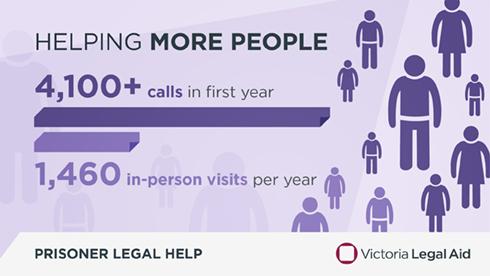
It is twice as time efficient than the visiting service, replacing face-to-face triage by senior lawyers, long travel times and wait times at prisons. This allows them to assist more prisoners. On average there were 25 calls from prison and 8 prison visits per day in 2018.
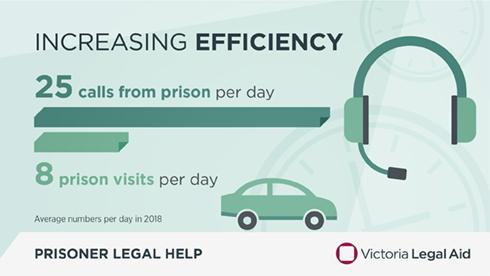
It is reaching vulnerable prisoners. Eight per cent of callers identified as Aboriginal and Torres Strait Islander, 33 per cent as culturally and linguistically diverse, 18 per cent were women, 44 per cent reported having a disability, and 33 per cent have lower levels of literacy.
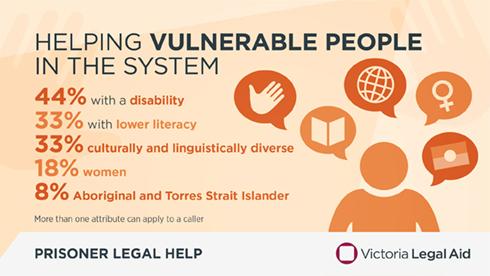
It is providing new legal services. Referrals are being made to our child protection service for the first time, and referrals into our family law program are more accurate.
Prisoners and prison staff reported a high level of satisfaction with the service. Ninety per cent of survey respondents (49 of 52) would recommend the service and almost as many found the service useful.
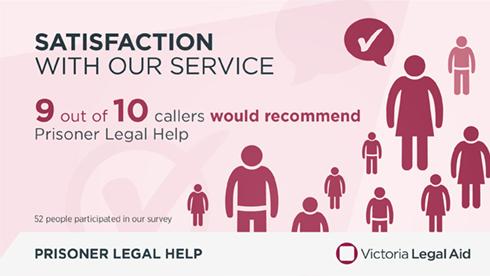
Prisoners indicated a significant reduction in stress after using the service.
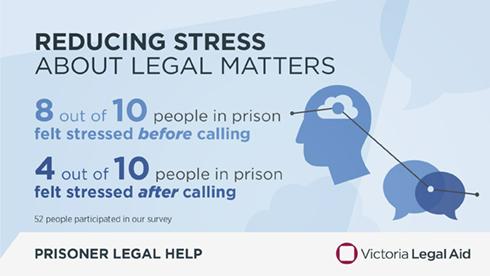
Unmet legal need persists. Enquiries about family and civil law matters are low, despite improved identification, triage, assistance and referrals. For example, enquiries about tenancy and civil debts were also lower than expected.
‘Keep this service going as it is very useful and helps a lot of people in the system. Thanks for your help.’ – Person in prison
‘Prisoners come in feeling very stressed about their matters … Great to have a service that new prisoners can be referred to. Anxiety levels can go anywhere if not managed. Having a phone to pick up on day two is very important.’ – Prison officer
Key recommendations
Our evaluation report makes 20 recommendations. The key recommendation is that Prisoner Legal Help be expanded to all Victorian prisons.
Other recommendations include:
- extending Prisoner Legal Help operating hours from 9 am to 4.30 pm to allow access for people in prison who work between 9 am and 3 pm.
- exploring ways of giving people in prison accessible follow-up legal information
- identifying ways of extending the service to more marginalised people in prison who are about to be released
- developing ways of attracting more enquiries involving family and civil law matters
- further developing relationships with prison staff, prisoner peer educators, prison support agencies, legal practitioners, government agencies and court services to promote the service, identify unmet family and civil legal need, and develop referral relationships
- improving referral pathways to progress and resolve systemic issues facing people in prison
- determining and meeting optimal abandonment rates.
Next steps
We will review recommendations for Stage 2 and work closely with internal and external stakeholders to expand the service to all Victorian prisons.
Read the full evaluation report
For more information, contact Prisoner Legal Help Senior Lawyer Gregor Husper or phone (03) 9269 0234 (switchboard).
Disclaimer: The material in this print-out relates to the law as it applies in the state of Victoria. It is intended as a general guide only. Readers should not act on the basis of any material in this print-out without getting legal advice about their own particular situations. Victoria Legal Aid disclaims any liability howsoever caused to any person in respect of any action taken in reliance on the contents of the publication.
We help Victorians with their legal problems and represent those who need it most. Find legal answers, chat with us online, or call us. You can speak to us in English or ask for an interpreter. You can also find more legal information at www.legalaid.vic.gov.au
Reviewed 22 March 2022
